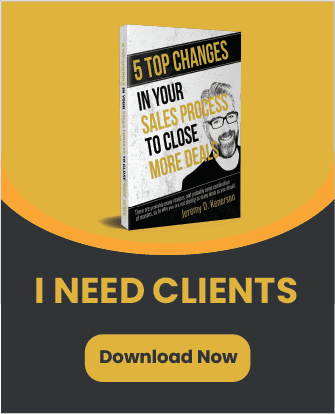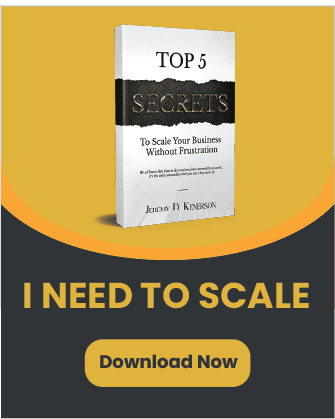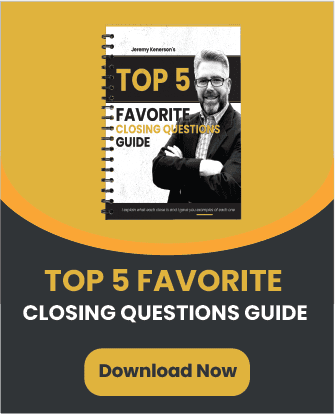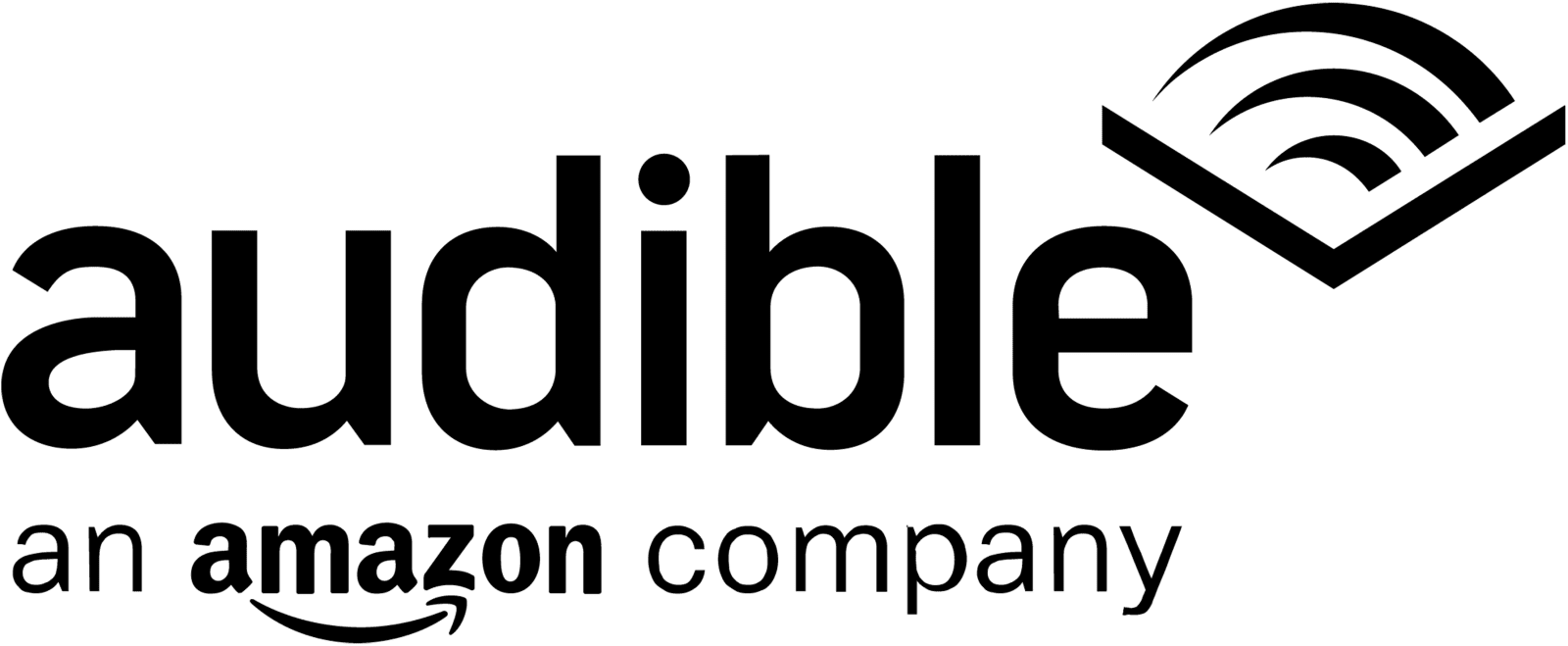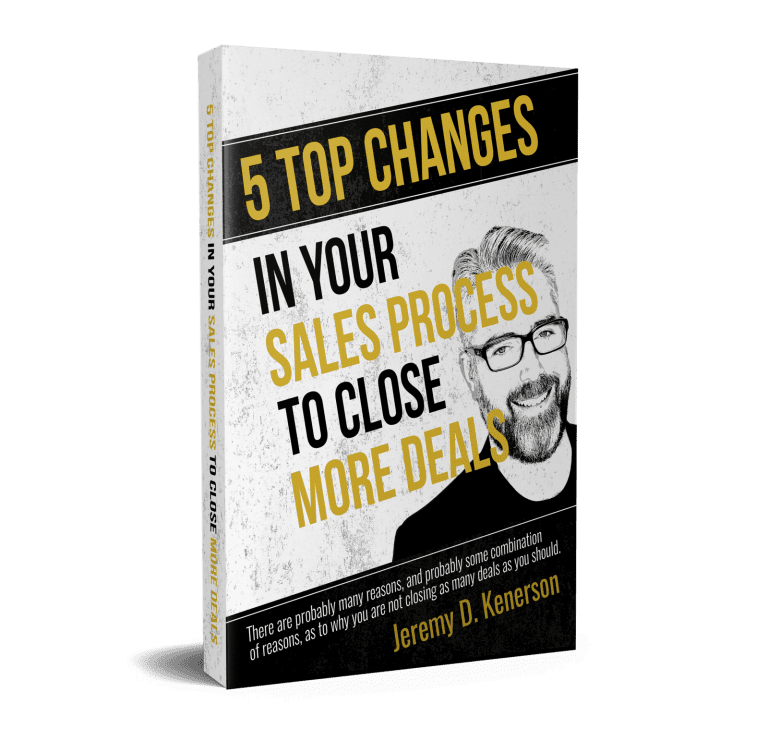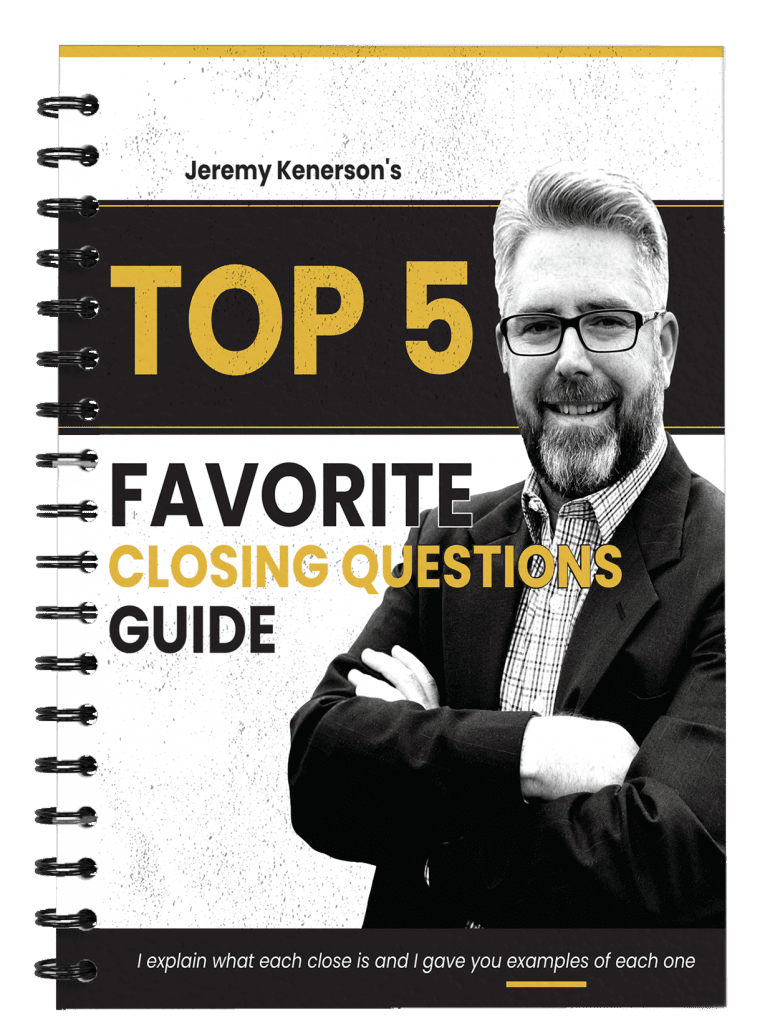Most entrepreneurs would say that overcoming objections in sales conversations is the hardest part of their business. So let’s make it a little easier.
Do you find yourself asking these questions in your coaching business?
- How do I grow my business?
- Why is my marketing not working?
- Which strategy should I actually be following?
- How should I be positioning my marketing message?
- How can I generate more leads?
- What can I do to close more deals?
The most critical question you should be asking yourself is: “Why are potential clients saying no when I ask them to buy?”
With these unanswered questions, we deal with having a fear of the unknown and fearing to fail. We deal with information overload from everything out there.
Then we end up not hitting our goals and not growing as fast as we want. And we soon find out that we don’t have enough time to learn everything. With all this going on in our minds, no wonder we struggle with answering the question, “How can I grow my business?”
I’ve dedicated my life to helping coaches find the peace and freedom they wanted when they first started their businesses by answering these questions. And I’m going to bring simplicity to these for you today to grow your coaching business.
If you would rather listen to the podcast than to read it here it is below!
Are You Getting a lot of No’s in Your Sales Conversations?
How many times have you been talking to someone, and they sound like they are just ready to cross the line and become a customer. Then you get that infamous, “No.”
No is the worst thing you could hear. Your dreams get crushed. Your heart’s torn out of your chest. And you don’t know what to do at that point.
Do You Feel Like Apologizing After Asking for the Sale?
I talked to somebody yesterday that was excited about his upcoming sales conversation. He was like, “Hey, I’m going to sell this person. I just increased my prices. I told him the price, and it was a lot. It is $10,000.”
And the guy goes, “Whoa… Whoa… That’s way more than I anticipated.”
And he said something I’ve never heard before, but I’m glad he was able to confide in me.
He said, “I almost wanted to apologize.” He felt terrible for quoting him that high price for what he does. But the guy’s good at what he does. So he’s worth the ten grand.
I know he’s worth the $10,000, but he felt like he needed to apologize. Thankfully he did not. He ended up closing the deal. It was for a little bit less than what he asked, but that’s kind of what happens sometimes in sales conversations.
So, what happens when we ask somebody to put their trust in us to do business with them, and they are like, “Oh, Whoa, whoa.”?
We immediately go into defense mode like, “All right, what did I do wrong? What can I say? What can I do to make sure this doesn’t go away?”
Sales Basics
There’s a lot that I could be covering in this, but I’m just going to cover the basics. Because really when you’re talking about sales, there’s an art and a science to it.
The science of the sale is more of a numbers game. We look at things such as:
- Sales statistics
- Conversion rates
- What do I need to do to close “X” amount of deals this month?
Read more about the science of sales in this book by David Hoffeld: The Science of Selling: Proven Strategies to Make Your Pitch, Influence Decisions, and Close the Deal
The art of the sale is the conversation. So that makes overcoming objections part of the art of selling. But there’s a lot that goes into it.
First You Must Ask for the Sale
I always tell people that you need to overcome objections before they become objections. That’s a whole long process. I want to help you start applying it to what you’re doing right now to close more business.
The number one thing that most entrepreneurs fail to do is actually ask for the sale. This will be in the form of closing questions.
These closing questions need to be something that just flows out of your mouth, and you’ve practiced a gazillion times. Once such closing question I use is “Hey, Visa or MasterCard bro.?”
Then the sales objections come up, right? They say, “Ooh, ah, about that. I don’t know if that’s too much,” or whatever.
Don’t worry. I will give you the step-by-step plan of what you can say to overcome those sales objections to close more business. Because if you just take the first no, you’re leaving so much money on the table, you don’t even know it.
Lessons I Learned as a Car Salesman
I remember a long time ago when I sold cars, that there were two rules in sales.
Rule #1 The First Person to Talk Loses
After you ask the sales question, such as “Hey, will that be Visa or MasterCard?” you need to shut your mouth. You wait for them to speak. You don’t say anything.
Rule #2 Expect More No’s than Yes’s
The other thing that they taught me is that you will get a lot of nos before you get a yes. And I remember hearing stories about people saying I overcame their objection. But what really happened is they stuck with it.
They got eight no’s before the person finally said yes. And it’s because they went through a similar process that I am sharing with you today to overcome sales objections.
There is even a whole book on the strategy of going for no by Richard Fenton. Check it out here: Go for No! Yes, is the Destination. No is How You Get There.
What Overcoming Objections in Sales are Not
- It’s not hard selling.
- You’re not going to sound like a sleazy salesperson.
All of those fears that you might have in overcoming objections put them aside. They are not actually feared. They are limiting beliefs.
Human beings, as a whole, have a survival mode that we activate when necessary. We want to protect our self-image. We want to make sure that we look cool and not like an idiot.
That’s the root of the problem that people have with sales, is their self-preservation. They don’t want to come across as a sleazy salesperson. Sales can be tough on your psyche. You may want to check out my blog to keep your mindset in check: How to Have a Positive Mindset in Sales When Life Sucks.
So when they get a “no”, they say, “Okay. You know, I get it. Maybe we’ll talk about it more next time.”
We do this because we want to treat people the way we want to “be treated.” I’m not telling you to stop doing that. Keep the golden rule in your life. It will show you have good character and integrity when you do that.
However, the psychology of persuasion says that people are immediately going to say no. That’s their defense mechanism. You can persuade without being that icky salesman.
Think of Sales as Sharing
- Are you passionate about your product or service?
- Do you feel that it will be a complete disservice not to share it with the world?
You can’t take no for an answer when it’s a disservice not to share. Sometimes you have to take eight no’s and do this process eight times.
It will feel a little awkward and crazy. But isn’t it worth it to feel uncomfortable and crazy eight times to allow that person to experience your product or service?
That’s the whole purpose of a business. Getting the sale is the only thing that will pay the bills and keep you in business.
I remember one time I did it 16 times with a person. 16 times the person told me no. If they really meant no, they would have got up and walked away.
Maybe in your case, instead of walking away, they can:
- Hang up the phone.
- Stop returning your messages.
- Ghost you on social media
If it’s an absolute no, that’s what will happen. But like I said, it’s like a defense mechanism. They may say no at first. But what they are really looking for is to have the assurance that it’s a good deal.
What they want to know is that they can trust you. They want to see that it’s a good service or product. Part of this in knowing your value in the market and who you are speaking with. More on that in How to Increase Sales blog post.
Two Most Common Objections in Sales Conversations
#1 The Money Objection
How many times have you heard, “I just can’t afford it right now. I spent $500 on my iPhone, and I can’t spend $100 on something that’s gonna make me healthy. I don’t have the money.”
They’re not saying that they don’t have the money. What they are saying is one of these three things:
- I don’t believe your product or service is a good deal.
- We don’t trust your product or service.
- I don’t know if I can trust you.
Have you ever seen the movie the Mask with Jim Carrey? Psychologists say everyone wears masks.
When you first meet someone, you’re not meeting them. You are meeting who they want you to think that they are. And it’s not until you get to know them that the mask comes off.
Then you think, “Oh my God, you’re not the same person I thought you were.” People in relationships end up breaking up because that person was crazy. They didn’t let their crazy out before.
It’s the same thing with an objection. The first thing that they tell you is not the truth. That’s what they want you to think. That’s one reason not to take no for an answer. You need to dig a little deeper.
You want to figure out early on in your conversation what the sales objections are, so you know what to say. Questions will have them admit something that alleviates money from being the real issue.
What Questions Do You Need to Ask for Sales Objections About Money?
You could casually ask a comparison question such as: “What do you like better?”
The sales conversation could go something like this:
Me: “Do you like Starbucks or Dutch Brothers?”
Prospect: “Dutch Brothers.”
Me: “Oh yeah. I’m a Dutch Brothers guy too.” Like, I’ve hit that place up like every day. What about you?”
Prospect: “Oh yeah. I love that place. I go there twice a day.”
Now think about it. That is twice a day for $5, which means he spends $10 a day on coffee times 30 days in a month. That’s $300 a month that he is spending on coffee that he doesn’t necessarily need.
You just figured out right now that he has an extra $300 a month. So what you need to do is persuade them to see that your product or service is worth more than $300.
Is your product or service worth more than the coffee? That’s perceived value. In the sales process, it is your job to ask questions and gather information in overcoming objections in your sales conversations later.
#2 The Objection of Time
Time is another common sales objection that you can overcome. How many times have you heard this:
“I just don’t have the time to do it. I would love to work out. I just don’t have the time to do it.”
Come on; anybody can find an extra 30 minutes to an hour a day to workout. It’s easy to find 30 minutes.
- You can wake up 30 minutes earlier. It’s not going to make you more tired when you wake up. But it will allow you to get more accomplished.
- Go to bed a little later.
- Manage your time better. Ohh, that’s a concept. A lot of us keep plugging along, checking tasks off our lists, and watching YouTube videos. We don’t manage our time efficiently.
Anyway, the moral of that story is, you can ask questions to find out what’s going on in this person’s life to find out where they’re wasting their time. Then when they have an objection of, “I don’t have the time,” You’re able to go, “Well, remember you said that you spend two hours a day watching TV? There’s your extra time to do this.”
You just have to make your product or service be perceived as a higher value than the enjoyment that they get out of watching Game of Thrones or whatever it is that they’re watching?
#3 The Fear Objection
Sometimes it isn’t time or money. It is fear of some sort. Th ey could be afraid of:
- Making a commitment
- That the product or service won’t work.
- They’re not going to get along with you during the process.
- That the company is going to go under
4 Step Process to Overcome Objections in Your Sales Conversations
Asking questions earlier in the conversation will give you the ammunition you need to overcome the objections later. But when you do get to the time to ask for the sale, there’s a process.
#1 Acknowledge the Objection
The very first thing you want to do is acknowledge the objection. What I mean by that is that you want your prospect to know that you were listening.
So many times in sales, you get the adrenaline going, and you are just trying to get through it. When your prospect says, “I just don’t have the time.”
Then you respond with, “Oh yeah, yeah, yeah. But really, this is a great thing you should be doing right now. You have to do it. So what do you say pal, are you in?”
When you completely disregard the objection they said, they feel like you didn’t listen to them. And when people feel like they haven’t been heard, they get angry. When somebody is mad at you, they’re not going to buy from you.
Example conversation
Here’s an example of what that would sound like in a sales conversation. “Hey, I completely understand that you don’t have the time to do this right now.”
You’ve acknowledged their objection. Your prospects know that you are listening to them. They know that you have a good character because you listened when 99.9% of the world has terrible listening skills.
Defenses come down a little bit.
#2 Transition
Then, the next thing that you want to do is transition. A transition would sound something like, “Hey, I totally understand that you don’t have the time to do this right now. However, what you said earlier…”
Then, you would fill in the different things they told you in the conversation. Here is an example.
“Hey, I totally understand that you don’t have the time to do this right now. But remember earlier, you were talking about how much you watch TV. You said you watch Netflix for four hours a day.”
#3 Overcome the Sales Objection
So you’ve acknowledged, transitioned, and now it is time to overcome the objection they have to what you are selling.
Like in the example above you complete it with words your prospect used in the conversation.
“Hey, I totally understand that you don’t have the time to do this right now but remember…” “Earlier, you said that you watched the Game of Thrones for four hours a day for the last five years.” “I can’t believe you’re not sick of it yet.”
“It seems like you could probably free up some of your time. Don’t you think?”
Then when your prospect says, “Oh yeah, I guess I could probably find some time.” you go to reclose the sale.
“Great. We got limited seating right now. I have three spots left. Did you want to use a Visa or MasterCard?”
#4 Tie Down Questions
What I like doing is what’s called the tie-down question. A tie-down question goes at the end of overcoming the objection. When you ask this type of question, their answer agrees with you.
Using the previous example, “If you’re watching Game of Thrones four hours a day, it sounds like you could give up two hours easy. That would be plenty of time to work out and get in shape, right?”
That question, at the end, is the tie-down question. More than likely, your prospect will come back with, “Yeah, I guess I could free up some time.”
Then the ball is in your court to close the sale. “Great. I got limited seats. Three spots left. Let’s get you locked in today, so you don’t miss out and keep putting this off forever. Visa or MasterCard?”
You may have to repeat this process over and over again. Just roll with it when they say no.
Mock Conversation for Multiple Sales Objections:
You: “Oh? What else is going on?”
Prospect: “Oh, man, I just don’t have the money for this right now.”
You: “Hey, I understand that you don’t have the money right now. However, earlier, you said that you go to Starbucks twice a day, and it seems like if you cut out just one of those coffees, you’d be able to actually get in shape.”
You: “As well as taking fewer calories and less sugar that’s producing the fat you’re trying to work off, you know? If you take one sugary Starbucks drink, then you have to go to the gym for three hours to work that off.”
You: “Are you going to the gym for three hours? That’s a lot of work. That doesn’t sound worth it, right?”
Prospect: “No, it doesn’t sound worth it.”
You: “All right, great. Again, I got three spots. I want to get you in here. I hate for you to put this off even longer. Do you want to use a Visa or MasterCard?”
What are they going to say? Yes, hopefully. But they could be like, “I don’t know. I just don’t think this is right for me.” Then you would keep going.
You: “I totally understand feeling that something’s not right for you. However, earlier you said, this is the perfect thing for you because you’ve been putting it off for so long.”
You: “So it sounds like this is something scary for you, but I’m going to be here for you. Let’s just do this together. What do you say?”
Prospect: “Yeah, I guess we should do it together.”
You: “Great. Visa or MasterCard”
Repeat this over and over again until they buy or …
How Long Do You Keep the Sales Conversation Going?
The old saying is they either buy or die, right? But when they say they are done, let it go. You don’t want to piss people off.
Hopefully, your product or service is going to help somebody have a better life. These thoughts and fears that go on in our heads prevent us from doing things that will make us have a better life.
You could say something like this if you would like. “So my job as a salesperson is to help you overcome those things. So please don’t take offense.”
Bonus Sales Objection Strategy: The Suppose Close
Another sales closing strategy I use is called the suppose close.
Here is a mock sales conversation showing you how it works.
You: “Visa or MasterCard?”
Prospect: “I don’t know. I just don’t have the time right now.”
You: “Oh, I totally understand you don’t have time right now. If you did have time, is there anything else stopping you from starting this program with?”
Prospect: “Well, even if I had all the time in the world I don’t have the money for it.”
You: “Okay. Well, if you had all the time and money in the world, is there anything else preventing you from doing this right now?”
Prospect: “Oh, I don’t know. I just don’t know if this is right for me.”
You: “Okay. Well, if you, if you knew this was right for you and you had all the time and money in the world, would you start this program with me today?”
Always make it today. If you use tomorrow or some other fictitious time your prospect may say, “Oh yeah, I totally do it six months from now.” But they don’t.
You can even use this as part of your suppose close. For example:
You: “So if you knew it was the right program and you knew it was good for you, plus you had all the time and money in the world, would you have started this program six months ago? If all those things weren’t an issue.”
If they still say no, ask what else is holding them back. Keep going back, acknowledging, transitioning, and overcoming until you overcome the last objection they have.
Then you can wrap it up like this: “All right, well, it sounds like time, money, fear of the product not working for you, fear of the program not being the right fit for you aren’t issues anymore, I got three spots left.”
“Let’s go ahead and get you in there, lock in your place, so you don’t miss out, and you don’t put this off any further. Did you want to use a Visa or MasterCard?”
When you put all their sales objections out in the open, there is nothing else to object to.
I hope this step by step process to overcoming sales objections has helped. Feel free to drop your questions and comments below. Let me know how this works for you. I think you might find more value from this blog post as well: How to Become a High Ticket Closer.




